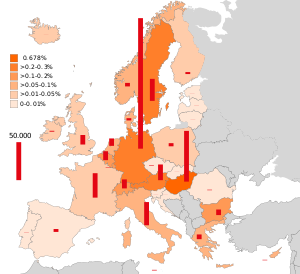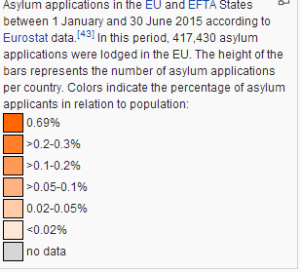Europe is confronted since the beginning of year 2015 with the extremely serious crisis regarding the exponential rise of the number of refugees within its borders. The wars in Syria and in Libya are at the origin of this increase for the majority of these refugees. However, world’s major powers have to share responsibility given the political and militaty impasse in the conflict zones from where they arrive.
This year as it has been reported that there was a 60 % increase of additional migrant arrivals in Europe. They are already more than 351 000 people who have taken the risk of crossing the Mediterranean Sea this year, for only 219 000 in 2014, according to the International Organization for Migration (OMI). Many drowned in the sea, as small Aylan, a Syrian child whose photo on a Turkish beach has shocked so much the planet this week, or during the appalling conditions of clandestine transport such as the example of 71 people found suffocated into a truck originated from Hungary.
- Europe is face to face with one of the biggest migrant crises since the World War II.
Regarding to recent history facts, more than 12 million German speakers were expelled from the Eastern Europe after 1945, the crisis of the Vietnamese boat-people at the end of 1970s (120 000 Vietnamese and Cambodian refugees were then welcomed by France) or even during the Balkan wars when Europe welcomed more than one million of refugees.
But How to explain such an increase of the migrants number in 2015? This has to do mainly with two causes while world’s major powers have their share of responsibility and they have to do more in order to cease the regional conflicts

1.The first is the sometimes-overlapping web of wars and crises that has forced millions of people from their homes in the Middle East, sub-Saharan Africa, and elsewhere — and that has opened, ever-so-slightly, a previously closed route to Europe.
2. The second, and less-discussed, is the increasingly anti-refugee politics in Western and other wealthy countries that are best suited to take them. People in those countries, insecure and fearful over the effects of immigration, preoccupied with vague but long-held ideas about national identity, are driving nativist, populist politics, and thus policies that contribute to the crisis.
The result is that, at a time when more people than ever need help, wealthy countries are more reluctant to help them — putting thousands or millions of innocent refugee families in peril. But Germany recently changed its point of view regarding refugees:
- Germany changed its refugee policy recently
For months, Merkel remained silent on the fate of refugees and the series of arson attacks on refugee shelters in Germany.The Dublin Rule that for years kept asylum seekers away from Germany’s borders has virtually collapsed. The agreement, which came into force in 1997, stipulates that refugees must seek asylum and remain in the first European Union (EU) country they enter. The agreement has proved extremely beneficial for Germany, which has no external borders with the regions from which most of the refugees come.
The EU’s Dublin Regulation places responsibility for examining an asylum seeker’s claim with the first EU country that the migrant reached. But Greece complained that it was inundated with applications, as so many migrants arrived in Greece first. Germany then suspended the Dublin rule and decided to consider asylum cases from the majority of Syrian applicants.
Finland is also among the countries that have stopped sending people back to Greece.
Other countries are also struggling with the influx of arrivals.
Austria says it is expecting 80,000 asylum applications this year.
Meanwhile several thousand migrants are camped around Calais in northern France. Many have been risking their lives jumping aboard UK-bound lorries and trains near the Channel Tunnel.
The massive influx of refugees from Syria and other countries that have been ruined as a result of the military and political intervention of the Western powers has overwhelmed the Dublin agreement. Refugees are either prevented from crossing borders by means of brute state force, or handed on as soon as possible to the next country.
Previously, the Dublin Rule kept refugees out of Germany. Now, it is doing the opposite. There is no country to which the German government can pass on the refugees.
- In Syria, there’s no hope anymore that the Syrian Civil War and ISIS territory control will end soon
Syrians refugees is the largest proportion of the total number of refugees have the biggest part of the number of refugees who tried to join Europe this year: about 350 000 applications for asylum have been filed since 2011. But those who try to join Europe are nevertheless a small minority of the uncalled-for. More than 4 millions of Syrians are refugees this year, according to the UNHCR, without counting the number of people who have been displaced within the country.
Neighbor countries such as Turkey, Lebanon and Jordan welcomed approximately more than 3 millions of this population, which is ten times more important than the number of migrants arrived this year on the European ground.Jordan, for example, has an annual per capita income of $11,000 and has received 630,000 refugees. Lebanon is richer, but has more than 1.2 million Syrians, making them about one-quarter of the population.
Turkey has the most, about two million, with a per capita income of $20,000.
The fact of ISIS unsactionned abuses to the Syrian people and only is not enough to explain the rise of departures from Syria to Europe. Syrian people were forced to flee after the extreme violence caused after the riposte of Assad’s loyalists to the Arab Spring uprising in Syria in 2011.
Bashar al-Assad’s regime has targeted civilians ruthlessly, including with chemical weapons and barrel bombs; ISIS has subjected Syrians to murder, torture, crucifixion, sexual slavery, and other appalling atrocities; and other groups such as Jabhat al-Nusra have tortured and killed Syrians as well.
- People flee by all means from the Middle East, Libya and some african countries (Somalia,Eritrea)
Add to that nearly two million more fleeing persecution in Afghanistan, Iraq and Somalia, and this becomes a crisis that no amount of European generosity can address.
The problem is likely to get worse. The war in Yemen, which resulted in an almost 80 percent of the population needing humanitarian assistance, and the long-running Libyan conflict have yet to release their burden of displaced and desperate people. When they do, it could add millions more to the region’s refugee exodus.
Many families in Eritrea, for example, are fleeing the dictatorship there that is sometimes called Africa's own North Korea. In Myanmar, the a Muslim minority group known as the Rohingya has endured brutal violence and ethnic cleansing, sometimes with the tacit support of the Myanmar government or even at the hands of government forces themselves.
Of course, the solution has to be an end to these conflicts and the associated persecution. But none of these conflicts shows signs of abating soon.
What about the role of the Gulf states regarding Syrian refugees?
How many Syrian refugees do you think the Gulf states took in? http://t.co/rIbEvLzfOX pic.twitter.com/QT404ZN7Z2
— Haaretz.com (@haaretzcom) 6 Septembre 2015
//platform.twitter.com/widgets.js
How many Syrian refugees rich Muslim Arab Gulf states r accepting? ZERO! Muslim Ummah doesn’t exist, it’s an illusion pic.twitter.com/Qb0Giy8DRh — Murtaza Ali Shah (@MurtazaGeoNews) 4 Septembre 2015
//platform.twitter.com/widgets.js
As Amnesty International recently pointed out, the “six Gulf countries — Qatar, United Arab Emirates, Saudi Arabia, Kuwait, Oman and Bahrain — have offered zero resettlement places to Syrian refugees.” This claim was echoed by Kenneth Roth, executive director of Human Rights Watch, on Twitter;
None of these countries are signatories of the United Nations’ 1951 Refugee Convention, which defines what a refugee is and lays out their rights, as well as the obligations of states to safeguard them. For a Syrian to enter these countries, they would have to apply for a visa, which, in the current circumstances, is rarely granted. According to the BBC, the only Arab countries where a Syrian can travel without a visa are Algeria, Mauritania, Sudan and Yemen — hardly choice or practical destinations.
No reason other than either indifference or a total lack of political will. In social media, many are calling for action. The Arabic hashtag #Welcoming_Syria’s_refugees_is_a_Gulf_duty was tweeted more than 33,000 times in the past week, according to the BBC.
“The Gulf must realize that now is the time to change their policy regarding accepting refugees from the Syria crisis,” writes the columnist Qassemi. “It is the moral, ethical and responsible step to take.”


Sources: Al-jazeera, NYtimes, Liberation, Le Monde, Lexpress.fr, Washington Post. Vox, BBC.com
Image: WIkipedia Credit:

Useful Links:
- Syria: Evidence of a fresh war crime as chlorine gas attack kills entire family
- MUSLIM COUNTRIES REFUSE TO TAKE A SINGLE SYRIAN REFUGEE, CITE RISK OF EXPOSURE TO TERRORISM
- Hungarian leader invokes Ottoman invasion to justify thwarting refugees
- Europe’s fear of Muslim refugees echoes 1930s anti-Semitism
-
Pope Francis Calls on Catholic Institutions to Take in Refugees
-
Refugees flow through Hungary and Austria, eager to reach Germany
-
Germany Swells With Thousands of Refugees, Migrants
-
U.S. Pressed to Take More Syrian Refugees
Books:
The Syrian Virgin: A Young Woman’s Journey From War in Syria to Love in New York: Volume 1 (The Syrian Virgin Series)![]()
The Syrian Refugee Crisis and Lessons from the Iraqi Refugee Experience![]()


Reblogged this on World4Justice : NOW! Lobby Forum..
LikeLiked by 1 person
A great and detailed post. Thank you.
LikeLiked by 2 people
Reblogged this on humanitycommonsense and commented:
Extremely well written and argued
LikeLiked by 2 people
Reblogged this on Sasson Hann and commented:
Reblogged on: https://sassonhann.wordpress.com/
Interesting analysis on the refugee crisis; we need these facts!
LikeLiked by 1 person
Thanks for reblogging
LikeLiked by 1 person
Reblogged this on perfectlyfadeddelusions.
LikeLiked by 1 person